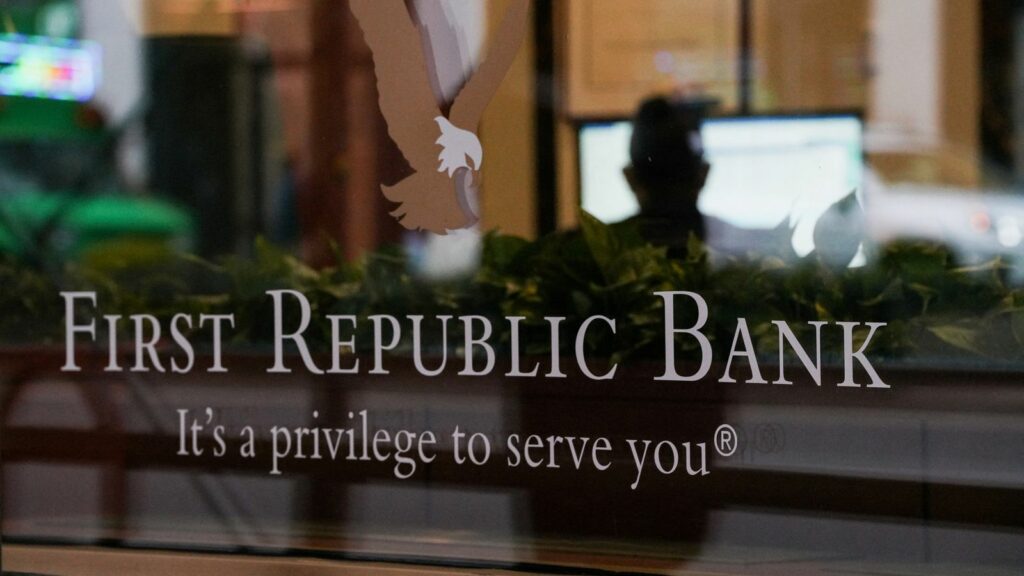Digital Zeitgeist – Troubled First Republic Bank Is Saved By A Group Of Large American Banks To The tune Of $30 Billion
As the whole financial industry has been beaten up by investors concerned about the effects of rising interest rates, the most powerful banks in the United States have sent out a strong message of unity.
Shares in First Republic – a San Francisco-based bank that largely caters to wealthier clients including Facebook co-founder Mark Zuckerberg – had fallen about 70% since the news of SVB’s collapse. They fell another 22% on Thursday before the bailout but ended the day up nearly 10%.
First Republic has seen customers pull their money following the failure of Silicon Valley Bank (SVB), and fears that First Republic could be next. Bank of America, Goldman Sachs, JP Morgan, and other financial institutions will deposit $30 billion in the bank, which has seen customers pull their money.
“The actions of America’s largest banks reflect their confidence in the country’s banking system. Together, we are deploying our financial strength and liquidity into the larger system, where it is needed the most,” the banks said in a joint statement on Thursday.
Investors’ relief, however, was short-lived. The bank’s shares, which had closed 10% higher after a volatile day that saw trading halted 17 times, slumped in after-market trading. Volume hit 15.6 million shares in the post-market session.
The decision to rescind the dividend was made after First Republic announced in a filing that it would be discontinuing it. Also, it said that its cash position was around $34 billion, minus the $30 billion in additional deposits it had received.
In addition, the corporation said that between March 10 and March 15, it had borrowed up to $109 billion from the Federal Reserve, and on March 9, it had borrowed an additional $10 billion from the Federal Home Loan Bank.
The reversal in First Republic’s shares after the rescue deal from the biggest U.S. banks underscores the extent of jitters in global markets, set in motion when two regional banks failed. Separate attempts earlier this week by U.S. and European regulators to calm investors through emergency measures to shore up confidence in the banking sector have not stuck.
According to Jason Ware, the chief investment officer at Albion Financial Group, the intervention in the banking industry that was led by Jamie Dimon on Thursday was a “shot in the arm for the system” but it is probable that more is required. Ware said that “It’s not big enough.”
Ware went on to say that this further solidified the investors’ suspicions that there were more fundamental issues with First Republic.
RESCUE PACKAGE
Founded in 1985, First Republic had $212 billion in assets and $176.4 billion in deposits as of the end of last year, according to its annual report.
According to a note from Bank of America, almost 70% of its deposits are uninsured, which is higher than the median of 55% for medium-sized banks and the third highest in the group behind Silicon Valley Bank and Signature Bank. The norm for medium-sized banks is 55%.
The shares of the bank have taken a significant beating over the last several days as a direct result of the failure of Silicon Valley Bank.
According to two persons who are familiar with the situation, Dimon brought up the possibility of a rescue package when he met with Yellen and Powell earlier this week as the situation became more dire.
According to two more people with knowledge of the situation, Citigroup Inc.’s Chief Executive Officer Jane Fraser also contacted big banks in an attempt to persuade them to participate in the rescue effort.
According to two of the persons who are familiar with the matter, an experienced solicitor at Sullivan & Cromwell named Rodgin Cohen was a key figure in the transaction. A request for comment was sent to Sullivan & Cromwell, but they did not immediately respond.
In order to save the failing bank, a number of significant financial institutions including JPMorgan Chase, Bank of America Corporation, Citigroup, and Wells Fargo & Company made uninsured deposits totaling $5 billion into First Republic.
Moreover, Goldman Sachs Group Inc. and Morgan Stanley have come to an agreement to invest $2.5 billion each. Other financial institutions, such as BNY Mellon, PNC Financial Services Group, State Street Corp., and Truist Financial Corp., as well as U.S. Bank, deposited a total of one billion dollars with the San Francisco-based lender.
The banks will keep the funds at First Republic for an initial term of at least 120 days.
“America benefits from a healthy and functioning financial system, and banks of all sizes are critical to our economy,” Citigroup said in a statement, underscoring the importance of mid-size and community banks.
“This show of support by a group of large banks is most welcome, and demonstrates the resilience of the banking system,” regulators said in a joint statement soon after the announcement.
Powell said that the Fed was always ready to supply liquidity via its discount window.
online sources: theguardian.com, reuters.com, news.sky.com, albionfinancial.com

